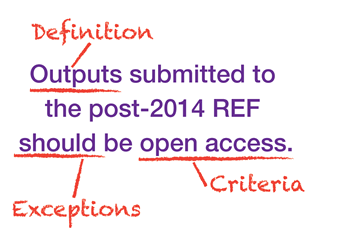Rick Anderson [RA] wrote:
"[A] policy that actually makes deposit mandatory is a mandate… But it appears that many of the institutional policies listed on the ROARMAP site... as "mandates"… actually require no deposit at all.  A few examples would be those of MIT ("The Provost or Provost's designate will waive application of the policy for a particular article upon written notification by the author"), the University of Oregon library ("The Dean of the Libraries will waive application of the policy for a particular article upon written notification by the author"), and the University of Glasgow ("Staff are asked to deposit a copy of peer-reviewed, published journal articles and conference proceedings into Enlighten, where copyright allows, as soon as possible after publication.")… [T]hey are policies that require no deposit… [W]hy the insistence on calling such policies "mandates"? If they make no action mandatory, then why not simply call them policies?
A few examples would be those of MIT ("The Provost or Provost's designate will waive application of the policy for a particular article upon written notification by the author"), the University of Oregon library ("The Dean of the Libraries will waive application of the policy for a particular article upon written notification by the author"), and the University of Glasgow ("Staff are asked to deposit a copy of peer-reviewed, published journal articles and conference proceedings into Enlighten, where copyright allows, as soon as possible after publication.")… [T]hey are policies that require no deposit… [W]hy the insistence on calling such policies "mandates"? If they make no action mandatory, then why not simply call them policies?

I agree that some of the "mandates" in ROARMAP are not really mandatory, although Merriam-Webster does give two senses of "mandate":
1 : an authoritative command...
2 : an authorization to act...
Academics do need both: an
official requirement (similar to publish or perish) (1) and
official backing from their institutions and funders (2), to empower them to deal with their publishers.
But many of the first wave of mandates are indeed weak, and some are not even mandates at all.
They are, however, increasingly being upgraded to
ID/OA (immediate-deposit/optional-access) (
Liège/
FNRS model):
In the UK,
HEFCE/REF's new policy will effectively make all funded research in the UK ID/OA, and the institutions will have to be the ones to ensure that researchers comply.
The EC's new
Horizon2020 is likewise an immediate-deposit mandate.
Many (including me) are working hard to try to ensure that the
US OSTP mandate and the
Canadian Tri-Agency mandate will be ID/OA too.
Both
Minho and
QUT have recently upgraded their institutional mandates to ID/OA. And several institutional mandate adoptions have lately been ID/OA.
The hope had originally been that the Harvard/MIT-style OA mandates, because they were (i)
self-imposed faculty consensus policies, would be even more effective than administrative mandates, and that because they (ii)
formally pre-assigned certain rights by default to their institutions in advance of submission for publication, they would strengthen authors' negotiating position with publishers.
"Each Faculty member grants to (university name) permission to make available his or her scholarly articles and to exercise the copyright in those articles… Each Faculty member will provide an electronic copy of the author’s final version of each article no later than the date of its publication [e.g., by depositing it in the institutional repository]…"
But in practice the Harvard/MIT-model OA mandates (often just called OA "policies") seem to have turned out to be less effective than had been hoped:
First, the Harvard model had (a)
had to allow author waivers, which in and of itself rendered the policy non-mandatory; but this in itself is not the problem, because only about 5% of authors formally request a waiver.
The problem is that (b)
most authors neither waive nor deposit.
The exact proportion of compliance is not known, because the policy is not binding on all faculty (because at Harvard not all Faculties have adopted it, and because at MIT a lot of collaborative project research is not bound by it) and (c)
universities in general currently have no way of knowing what their total published research output is. (Enabling institutions to keep track of their own research output was in fact one of the secondary purposes of OA mandates and institutional repositories.)
So, as with other OA policies, implementation at Harvard and MIT has been reduced to librarians trying to chase after authors to provide their papers, or trying to retrieve their authors' published papers from the web (where they have sometimes been made OA on institution-external sites). I believe librarians even try to retrieve their institutional authors' papers from publishers' websites, when the library has licensed access -- but then they languish while the library or repository staff try to figure out whether or when they have the right to deposit them. (This, despite the fact that there are only 5% waivers of the default rights-retention clause!)
It is quite problematic that because of its distinguished source the Harvard OA policy model is being widely emulated in the US even though it is now 5 years since it was first adopted in 2008 and
yet there are no data available on how well it works compared to other mandate models (or no mandate at all).
In principle, if Harvard takes it seriously that 95% of Harvard faculty have not waived a default rights-assignment policy, then they can make 95% of Harvard papers OA in Harvard's institutional repository immediately. The question is: which version? If authors have not provided their final refereed drafts, it is unclear what can be done with the publisher's PDF.
The Glasgow policy -- I agree it's not really a mandate, and I have just downgraded it to a non-mandate in ROARMAP -- is the weakest kind of OA policy of all: "Deposit if and when your publisher says you can!"
This is why it's so important that institutional and funder mandates should be (I) upgraded to all require immediate deposit and (II) harmonized to all require institutional deposit, with (III) deposit designated as the sole official mechanism for submitting refereed journal articles for individual performance review, institutional research assessment, research funding applications and fulfillment, and official academic CVs.
(If institutional rights assignment is waived, the publisher has an OA embargo, and the author wishes to comply with the embargo, access to the deposit can be set as Closed Access instead of OA, and the repository's automated request-a-copy Button can provide "Almost-OA" during the embargo with one click each from each requestor and the author. But the deposit must be immediate in any case.)
The UK's
HEFCE REF2020 and the EU's
EC Horizon2020 mandates should soon both be harmonizing institutional mandates in this direction. Let's hope the US, Canada, Latin America, Australia and the rest of the research world will soon follow suit. OA is already fully within reach and absurdly overdue. Let's this time have the good sense to grasp it.
Stevan Harnad




